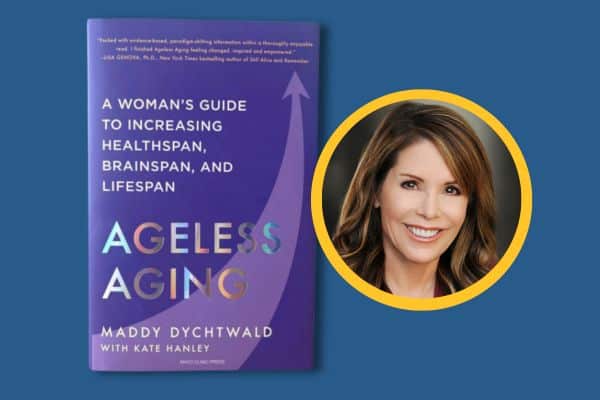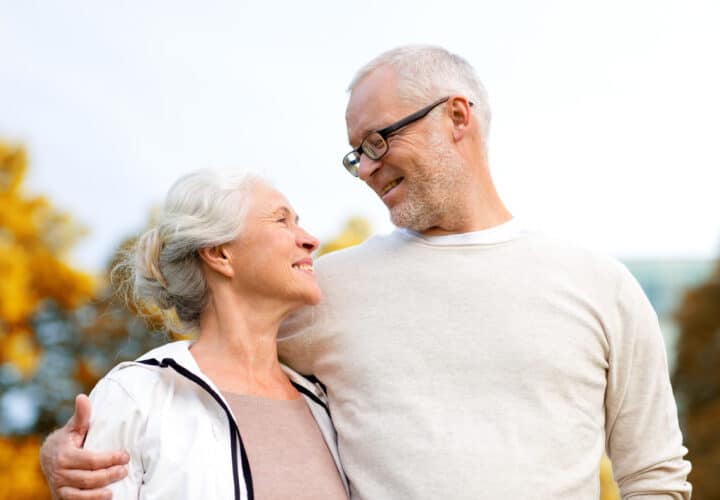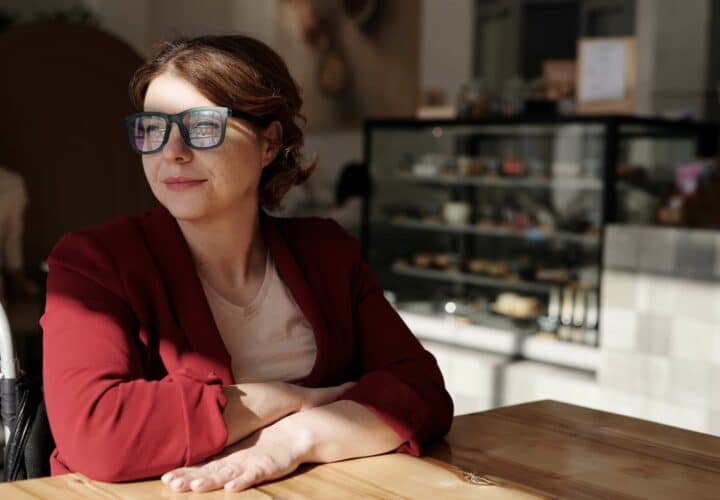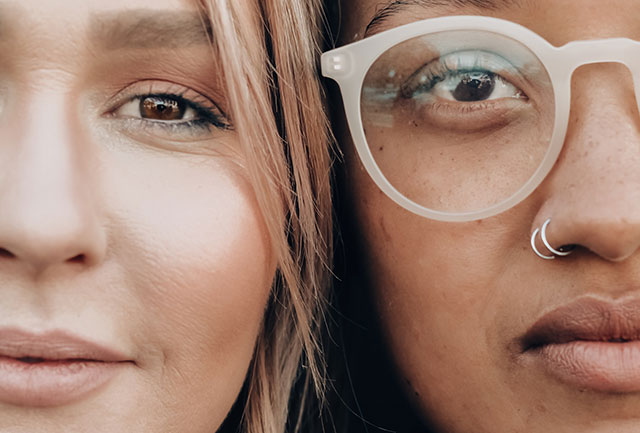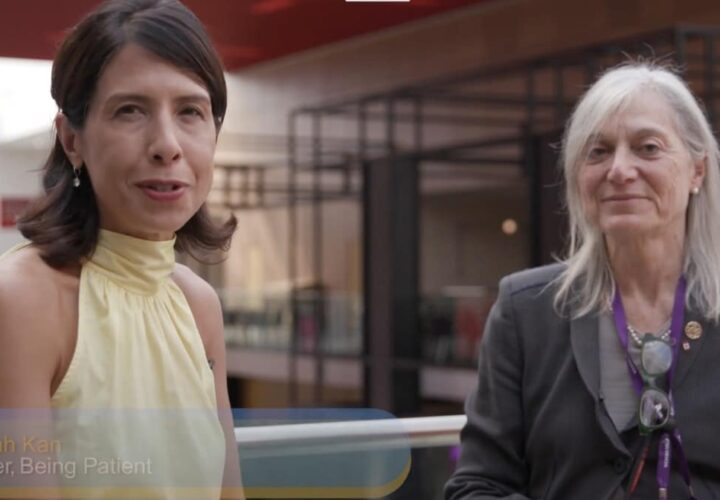Women have a longer lifespan, but can they also increase their health-span? Age Wave Co-Founder Maddy Dychtwald discusses her latest book, Ageless Aging, on women's health and longevity.
When entrepreneur and futurist Maddy Dychtwald took a careful look at the longevity space, she found there were very few books out there tailored to women and the full picture of female health. Women do tend to live longer than men. But they’re also at higher risk for many health issues, including Alzheimer’s disease.How should women be thinking about aging to achieve not only longer lives, but healthier ones?
“We have tremendous agency over our own health and well-being,” explains Dychtwald, who through her organization Age Wave helps women understand and address the far-reaching impacts of longevity and the world’s aging population. “That’s part of what drove me to write my book Ageless Aging, to get that message out to other women like myself, who don’t want to just live long, but we want to live well.”
With her experience at Age Wave and by interviewing experts in the longevity space, Dychtwald wrote Ageless Aging: A Woman’s Guide to Increasing Healthspan, Brainspan, and Lifespan (Mayo Clinic Press, 2023), detailing research on longevity and aging with a specific eye toward key strategies women can take to improve their brains and overall health as they age.
Dychtwald joined Being Patient Founder Deborah Kan on Live Talks to discuss the book and some of her takeaways on improving health and longevity. Read or watch the conversation below.
Being Patient: Is age just a number?
Maddy Dychtwald: Oh yeah, it’s chronology. There are three different kinds of aging, and chronologic, the number of birthdays we have is just one of them. There’s also [biological] aging, which is what’s going on inside your body, and we know now that can be tested, which is great news. Then there’s the other kind of aging, the third kind, which is our emotional psychological aging. What I love about that is that’s kind of what you gain as you get older.
We gain, hopefully, some wisdom, certainly some experience. From the studies we’ve done at Age Wave, we’ve learned that particularly women, we gain a kind of resilience. We’ve experienced maybe some deaths in our family, maybe some illness, maybe some challenges of all kinds, with our kids, with our parents, with our spouses, with ourselves, and it’s helped us build resilience. I love that.
Being Patient: In the book, you started out with an injury that was an eye-opening moment for you about aging and recovery. Can you tell us about that?
Dychtwald: I had my own Ageless Aging “Aha” moment, and it didn’t happen just like that. It happened over time. I’m a big exerciser. I was coming home from exercise sessions with limps. I was literally limping, and then it started showing up in my day-to-day life. I was in a lot of pain, honestly, to the point where my son finally said to me, “Mom, get yourself to the doctor.”
I tried everything. I tried cortisone shots, PRP, and stem cells. Some of it worked for a very short while, but it wasn’t really solving the problem. So, finally, I went, and I got an MRI, and the doctor sat down with me. He literally took my hands in his, which is kind of odd for a doctor. Actually, it was really nice. He said, “You’re going to get better. You have what’s called hip dysplasia. That’s what kids are often born with. You were probably born with it.”
[He said], “Today, with little kids, we fix it when they’re infants, but since [when] you were born, 68 years ago, that didn’t happen, so you need to get a double hip replacement.” He suggested I see a doctor who specializes in double hip replacements. I did and went to the doctor [and] set up an appointment, but he couldn’t see me for a few months. I said to him, “Well, what should I be doing in the meantime?” He looked at me and said, “Maybe you should get a cane.”
“I had my own Ageless Aging “Aha” moment,
and it didn’t happen just like that.”
Being Patient: How old were you at that point?
Dychtwald: I was 68. I was a really active, vital 68. Mentally, I didn’t see myself going with a cane. I mean, if you need one, get one, but I didn’t feel that was me. I’m the co-founder of Age Wave. We’re a think tank focused on research, specifically on aging and longevity. We rely on the top experts to help us in our research. I reached out to some of them, like Andy Weil and Mark Hyman, and what I learned was there were some things I could do. I could take control, and so I did. I changed my diet rather dramatically.
Being Patient: Is this the inflammatory diet you spoke about in your book?
Dychtwald: That’s what I did. I went on an anti-inflammatory diet. I cut out all dairy, cut out mostly all sugar, and I cut out all gluten. I don’t have a gluten allergy, but there are pesticides that are sprayed on gluten-related products that can be pretty damaging to us. The amazing thing, within literally six weeks, all the pain in my hips went away. All of it.
It was to the point where I considered, “Well, maybe I shouldn’t even get the surgery, except I was bone on bone in both my hips.” One of the miraculous things that happened out of it was the doctor said to me, “Okay, you’re going to be in the hospital for a week, then at home for a month. You’ll probably need first a walker, then a cane.” I’m like, “Okay, that makes sense.”
But with my anti-inflammatory diet, upping my exercise, not lowering it, and changing my sleep patterns a little bit, doing a few other things that were pretty remarkable— instead of in a week, I was home [from the hospital] in a day. They won’t let you out of the hospital unless you can walk the stairs, so that was great. Then, within two days, not one month, I was walking without any assistance at all.
Now, I would say I walked a little bit like a duck, but I was walking on my own, which was incredibly empowering. It made me realize [that] we have tremendous agency over our own health and well-being. That’s part of what drove me to write Ageless Aging, to get that message out to other women like myself who don’t want to just live long but want to live well.
Being Patient: Why did you choose to focus specifically on women in Ageless Aging?
Dychtwald: When I decided to write this book, I looked around at the longevity landscape, and I saw, yeah, there are books out there on longevity, but I noticed two things in particular. One, I couldn’t really find many books on longevity that were written by women for women. I’m like, “Well, wait a minute, that’s a mistake we need to correct,” because there are ways that women and men are different.
“We have tremendous agency
over our own health and well-being.”
Second, I noticed that there were a lot of books on sleep, supplements, [and] exercise, but I couldn’t find many that were [on] a holistic approach, which is the approach that I take. [That’s] where it’s not just about one thing, like exercise, though exercise is incredibly important, but it’s about a combination, a holistic soup of ingredients that work together. They’re not in silos [or] independent. They actually help each other and make you know your life better as a compliment to one another.
Being Patient: This is one of the things we’re learning at Being Patient. It’s really how different biological systems relate in a symphony to achieve optimal health—especially with your brain.
Dychtwald: No doubt about it, and a lot of people, when they talk about health— they stop at the neck.
Being Patient: In your book, you discuss the importance of setting a daily routine and taking small steps to gradually change your habits and improve your health. I do a lot of what you mentioned in your book, but meditation has always been really hard for me. So, I’ve been trying to integrate that, just a couple of minutes a day. Let’s take exercise, for example. What’s optimal in terms of thinking about adding or changing how we exercise as we age?
Dychtwald: Let me unpack that question a little bit. Like you, I love cardio. Put me on a treadmill, and I’ll run for 35 minutes. Put me on an elliptical, and I love it. Or jogging or taking a hike—I love doing that stuff. But I wasn’t as addicted to some of the other forms of exercise, and I didn’t realize that not only is cardio important but there are things that are even more important.
“A lot of people, when they talk about
health—they stop at the neck.”
There are six different kinds of exercise; like it or not, as we get older, we’ve got to do all of them. One of them stands out, and that’s muscle strength. I know you’re aware of this, but I don’t know if your listeners are, [but] as early as in our 30s, we begin to lose muscle mass, and not only does that look funky, which it does, but it’s bad for your bones. It’s bad for your overall health and well-being. It’s even bad for your brain.
Being Patient: Is that called sarcopenia?
Dychtwald: That’s exactly what it’s called, yes. In fact, Dr. Carla Prado told me that [she] believed that muscle mass should be a new vital sign, similar to our blood pressure or our heart rate. That’s how important it is.
Muscle strength is incredibly important. I would say posture and balance are important. I would say relaxation. You said before [that] you’re not very good at that. I’m not either, but it’s definitely part of the pie.
When it comes to exercise, we need to integrate all of the pieces and try to integrate some of them together to make it easier. It’s called stacking. For instance, if you’re going to run, run with a friend. Not only run with a friend, but if you know, stop along the way, bring along a band, and do some strengthening exercises. At the end, be sure to stretch. There are ways to make it work.
Being Patient: We have a question from our audience. Can you tell us more about HRT and aging? She’s been on HRT after menopause for around 15 years or so. The messaging on HRT can be confusing, even with doctors, so could you tell us about the current research on HRT and aging for women?
Dychtwald: You’re right. It’s totally misunderstood, even by doctors, even by gynecologists. It’s based on a study that was done, a longitudinal study. It was 2004 [and] it was the Women’s Health Initiative study. [It was a] big study, but it was a very flawed study, and yet this study is what many gynecologists, very well-meaning gynecologists and physicians, reference when they say, “No, you don’t need HRT.” Now, the assumption built into that is— we’ll get to the flawed part in a minute.
But the assumption is, “Oh, hormones, it’s just symptom-related. You’re just going to get hot flashes and maybe a little palpitations and can’t sleep for a couple of nights.” Well, that’s not it at all. Honestly, there are real health risks, particularly when it comes to brain health [and] when it comes to losing estrogen. Estrogen is something that our body needs. When we don’t have estrogen in our system, the size of our brain can actually decrease. That is not what you want to have happen.
Let’s go back to the flawed part of the study. There were a few pieces of the study that were flawed. Number one, the study was done on all women over the age of 65. [It is not recommended] to start taking HRT after the age of 65. If you started taking it before the age of 65, well before would be the preference, then you’re fine.
I’ll use myself as an example. I started taking HRT when I was 50 or 52. I’m 74 years old, and I’m still taking it. Knock on wood, I’m still pretty healthy, and, in fact, it’s really helped me. It helps me with my sleep. It helps me keep my metabolism in a good place in a variety of different ways. That’s one thing.
“There are real health risks,
particularly when it comes to
brain health [and] when it
comes to losing estrogen.”
[The] second thing about the flawed study is they did not use bioidentical hormones. They didn’t use estradiol, and, by the way, the best kind of estradiol to be using is a patch, much better than taking a pill. So, keep that in mind.
Being Patient: As it’s been described to me by scientists, women go through menopause at different rates. Some people fall off the cliff in terms of estrogen levels, and others, it’s more gradual. What you really want to do is keep it more gradual. I think a lot of the complications I’ve been told about in the beginning stages of HRT were that we were medicating women in their 60s like they were 14 years old, and that’s where problems existed.
Dychtwald: For sure, but I would add that there are two different approaches that are available for taking HRT and that the first approach is just what you said, and it’s what I do. I started a long time ago just taking a very small amount to tweak my estrogen and progesterone so that I was sleeping okay, that my brain stayed healthy, so that my heart and my metabolism, my whole systems were still running effectively. That’s what I have chosen to do.
However, there is another approach, and the other approach is the more aggressive approach. That is to try to increase your capacity, to improve your longevity. To improve your longevity, you need to take higher doses. That’s not something that you should start in your 60s.
That’s something; if you’re to do it, you need to do it under a doctor’s care, and hopefully a functional medicine or a gynecologist or someone who is an expert and who can test you continuously. That’s a whole different game that’s to increase your lifespan and hopefully your health-span as well, but it’s a different set of dynamics.
Being Patient: Do we know why estrogen is connected to our life and health span?
Dychtwald: I don’t know that I can answer that question or answer it simply, but we do know that it’s not just about symptoms; it’s about our health and that our brain health, in particular, is very affected by our hormones. Our hormones are part of a very complicated system of systems that work together to try to keep us healthy and live long lives.
Being Patient: I remember going to a conference and interviewing a few female hormone researchers, and they all told me they had the patch. So, I went straight to my doctor and asked them about the patch. Sometimes, it has to come from you, but like you, I’ve been taking HRT for a number of years, and I feel good, and it’s keeping my health in check.
Dychtwald: Can I just add a caveat to that? Because there is an important caveat. There are some women who are at risk, and they should either not be taking HRT, or they should be doing it under very close doctor supervision.
“Our hormones are part of a very
complicated system of systems that
work together to try to keep us
healthy and live long lives.”
It’s about the progesterone. If you have reproductive health, breast cancers, or ovarian cancers in your family, you need to really see a specialist, a menopause specialist, who understands some of the potential risk factors. If you are to take it, for instance, you can use what’s called a Mirena IUD instead of progesterone, and it increases the safety factor. So, there are some things I just want to be clear about.
Being Patient: 100%. This is not at all to suggest we should be prescriptive about any of this.
Dychtwald: This is all based on science and what physicians have recommended. Again, reach out to a menopause specialist. Not all doctors are equipped because they have so much on their plate, and there are so many studies that come out that it can be overwhelming to them. I understand how they may not be up to date on all the information out there.
Being Patient: I’m getting another question from the audience. For women who shouldn’t do HRT, what do you think is the next best thing?
Dychtwald: I alluded to it, but there are a couple of things. One is [to] take estrogen with the Mirena IUD. That’s one possibility. Again, check with a menopause specialist to see if you’re a good candidate for that.
There are also some antidepressants specifically designed to try to minimize some of the symptoms and some of the health risks and depression, [which] is one of the health risks that are associated with hormone depletion.
Those are two examples, but again, I would urge you to see a specialist. I’m gathering the information and the data as best I can, but there are physicians who really are specialized in this and they can help you work through some of the possibilities.
Being Patient: Are we seeing more “ageless aging” or people living healthier lives as they age? Or do you feel like there’s still a lot of work to be done in order to achieve that?
Dychtwald: I think there’s a lot of work to be done, no doubt about it. We’ve done a great job expanding our lifespans, especially for women. We live, on average, five to six years longer than men, and that’s incredible. That’s quite a feat of science and of our lives.
Secondly, our health spans, or the number of healthy years that we have for women, it’s not as good as it is for men. We spend, on average, the last 12 to 14 years in a cascade of poor health, and that is no way to live life. Now, there’s some good news in this bad news. The good news is that we used to think it was all about genetics, and that was kind of like it was out of our hands.
[We thought that] 70 percent of our health and well-being had to do with our genetics, but the most recent science from Calico Labs tells us that up to 90 percent of our health and well-being is within our control— having to do with lifestyle, having to do with our environment. That gives us, especially us women, incredible agency over our own health. We are in control, but we need to take control.
“We are in control, but
we need to take control.”
Being Patient: It’s interesting that health spans deteriorate so much. Is this attributed to comorbidities or other diseases? What is making us suddenly have a lower health span towards the end of our lives?
Dychtwald: Well, I think it’s the way we live our lives. Frankly, we know the right things to do. Many of us understand. We may not know the nuances, but we understand that exercise, diet, sleep, and stress— those things have a dramatic impact on our health and well-being. We know that.
We know that diabetes, for instance, is one of the biggest risk factors for Alzheimer’s disease. In fact, some people call it “Type-Three Diabetes,” but we don’t necessarily take action against it. It’s what we call, at Age Wave, the “Intention-Action Gap.” We know it’s there, but we don’t take action against it.
Now, you know, if we stopped eating all that ultra-processed foods and the seed oils and started eating more fruits and vegetables, that would be one big step towards [better health], and it’s simple. We all know it. We all have heard about intermittent fasting by this time. By changing not just what you eat but when you eat can make a huge difference.
Exercising every single day—doing something that’s exercise—can really be an elixir for your life, and that is something that we all ought to be doing. [We should also try] to get some sleep, seven to eight hours of sleep a night.
I’m not a great sleeper. I’ve gotten way better because I’ve really taken to heart this idea that circadian rhythms actually control my sleep. So, the first thing I do in the morning is open up my shades and kind of worship the sun, and in so doing, I set myself up for a better night’s sleep. There are things that we can do, but we’ve gotta do them 100 percent.
Being Patient: One example for me was having a glass of wine after work, usually while cooking. I said, “What’s going to happen if I don’t have that glass of wine?” I tried it for two months, and my sleep totally changed. Waking up in the middle of the night no longer happens to me. As soon as I eliminated alcohol, even though I wasn’t drinking a lot, it had a direct impact on my sleep.
Dychtwald: That’s right. I mean, alcohol, according to the most recent science, [has been identified as one of the] three risk factors that are bigger than all the other risk factors for getting Alzheimer’s disease and cognitive decline. Limiting alcohol, or eliminating [it], is really the step to take, is one of the biggest steps you can take.
“We understand that exercise,
diet, sleep and stress—those things
have a dramatic impact on our
health and well-being.”
Also, diabetes is a huge risk factor, so minimizing your risk of diabetes, or if you do have diabetes, taking steps to keep it in control is really important. The third one was really a surprise to me, and that is our environment, our indoor air quality. That’s something with air filters that we can take some steps towards and opening windows.
Being Patient: Through your work at Age Wave, tell us a little bit about trends coming up besides the ones we discussed. What should be on our radars?
Dychtwald: We know that longevity is here to stay and that it’s exploding. It’s really having a moment, and that’s impacting the work we do at Age Wave and again, we’re a think tank. We’ve worked with, I would say more than half of the Fortune 500 and more than half the Fortune 50. What we’ve seen is this whole retirement thing and health in retirement, and also like finances in retirement. Finances are one of those pieces of the longevity puzzle that people are not talking about a lot— that’s catching fire.
People want to know, “How do I plan for retirement? How do I extend my working years? How do I, in fact, do things with a sense of purpose once I do retire?” These are important things. If you’re going to live to 90 or 100, does it make sense to retire when you’re 65? Do you have the health or the finances to do that? I don’t think so.
Being Patient: 100 percent. Ageless Aging was really eye-opening for me in a lot of ways, and you did a great job making the information highly digestible, interviewing some of the world’s leading experts, and then giving the reader an opportunity for accountability. How do we start today? As I said before, the moral of the story is to take baby steps. A lot of baby steps lead to big changes, right?
Dychtwald: Absolutely true. We can all live better and longer. We have that agency over our own health and well-being.
Katy Koop is a writer and theater artist based in Raleigh, NC.
